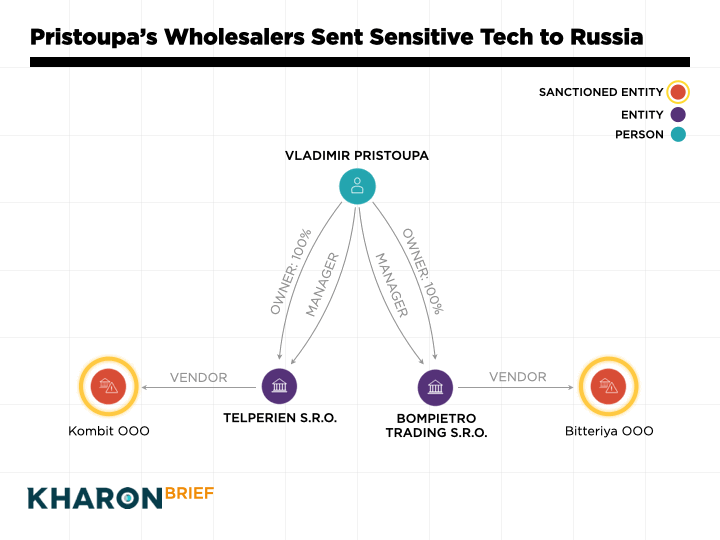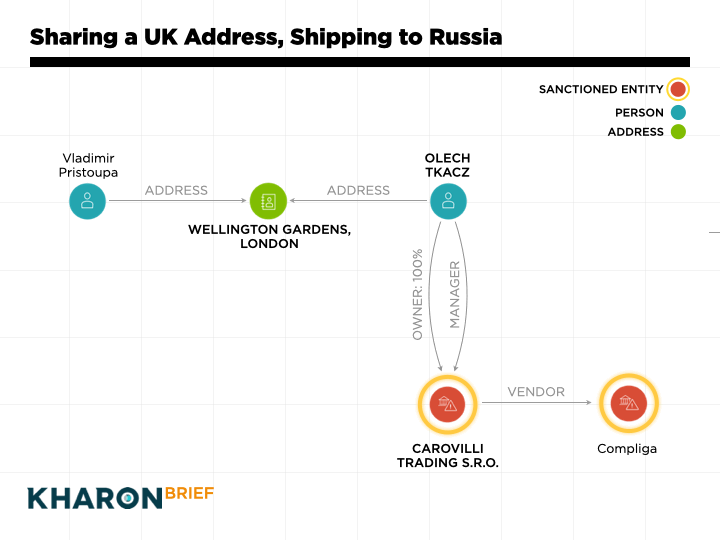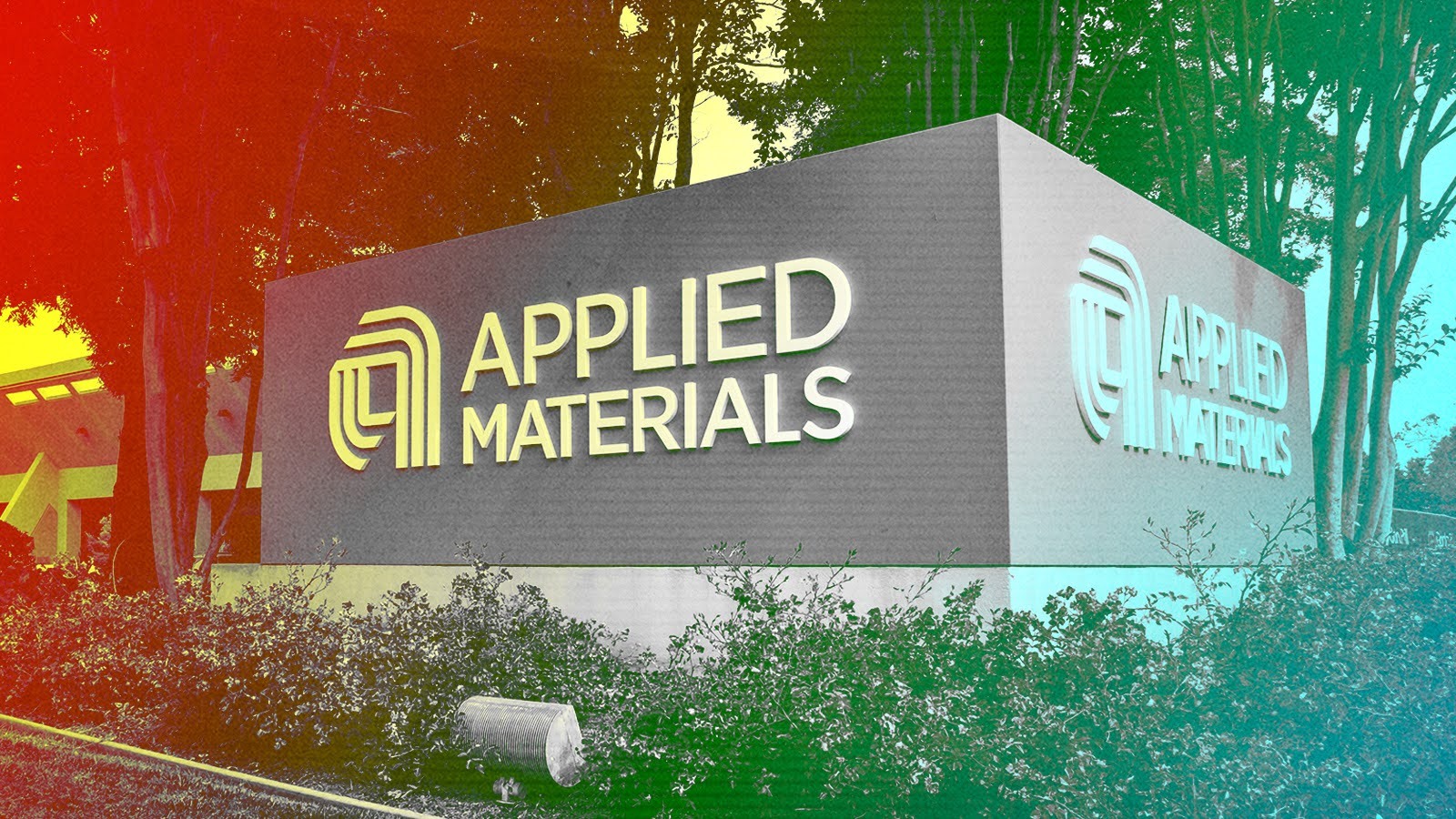Update (6/17/25): The U.K. announced today that it has sanctioned Vladimir Pristoupa and Olech Tkazc for “making available goods or technology that could contribute to destabilising Ukraine.“ The two men, the U.K. wrote, “have been operating a network of companies” that “have been supplying Russia with goods on the UK's Common High Priority Items list, specifically electronics.”
In the spring of 2024, just over two years into the war in Ukraine, a Slovakian wholesaler sent 36 shipments to the Russian company Kombit OOO, which the U.S. State Department would sanction months later. Inside were data-processing units that the EU had already restricted, manufactured by a major Western computer and chip company.
In the sprawling network of Vladimir Pristoupa, that dubious transaction was no isolated case, Kharon found. Pristoupa, a British national and discredited accountant who owns that Slovakian wholesaler, has deep ties to Eastern European business and a prolific track record of forming and managing corporate entities.
A Kharon investigation connected Pristoupa to more shipments of sensitive electronics that the EU, the United Kingdom and other governments have placed on their Common High Priority List (CHPL), because Russia is seeking them for military use. The investigation also connected him, many of his businesses and an international partner to one shared London address.
Paper trail: Pristoupa is listed as a director and/or beneficial owner of at least six active U.K. holding firms and repeatedly has appeared in the filings of now-dissolved or inactive companies, many of which were short-lived.
His U.K. dealings establish a pattern that he previously appeared to follow in the Czech Republic. There, Pristoupa was the beneficial owner of Bardet s.r.o., a technology wholesaler with very little share capital. The company had no clear economic output itself, according to Czech court records, but it had a bank account through which large sums of money from seemingly unrelated firms would move. In 2018, the Czech Republic seized $13 million in assets from Bardet s.r.o. for attempted money laundering.
In January 2024, the U.K. Association of Accounting Technicians expelled Pristoupa for offering accounting services without a license or registration “in contravention of the Money Laundering Regulations.” More than a year later, he appears in filings as an “accountant” for multiple firms, in addition to his own ventures.
Inside the network: Pristoupa now wholly owns two IT wholesalers in Slovakia: Bompietro Trading s.r.o. and Telperien s.r.o., the one that shipped to Kombit OOO. Between 2019 and 2024, trade data shows, the companies sent more than 1,250 total shipments of CHPL items to a pair of Russian firms that the U.S. has since sanctioned. The exports included sensitive technology manufactured by major Western and Asian companies.
In the spring of 2024, just over two years into the war in Ukraine, a Slovakian wholesaler sent 36 shipments to the Russian company Kombit OOO, which the U.S. State Department would sanction months later. Inside were data-processing units that the EU had already restricted, manufactured by a major Western computer and chip company.
In the sprawling network of Vladimir Pristoupa, that dubious transaction was no isolated case, Kharon found. Pristoupa, a British national and discredited accountant who owns that Slovakian wholesaler, has deep ties to Eastern European business and a prolific track record of forming and managing corporate entities.
A Kharon investigation connected Pristoupa to more shipments of sensitive electronics that the EU, the United Kingdom and other governments have placed on their Common High Priority List (CHPL), because Russia is seeking them for military use. The investigation also connected him, many of his businesses and an international partner to one shared London address.
Paper trail: Pristoupa is listed as a director and/or beneficial owner of at least six active U.K. holding firms and repeatedly has appeared in the filings of now-dissolved or inactive companies, many of which were short-lived.
His U.K. dealings establish a pattern that he previously appeared to follow in the Czech Republic. There, Pristoupa was the beneficial owner of Bardet s.r.o., a technology wholesaler with very little share capital. The company had no clear economic output itself, according to Czech court records, but it had a bank account through which large sums of money from seemingly unrelated firms would move. In 2018, the Czech Republic seized $13 million in assets from Bardet s.r.o. for attempted money laundering.
In January 2024, the U.K. Association of Accounting Technicians expelled Pristoupa for offering accounting services without a license or registration “in contravention of the Money Laundering Regulations.” More than a year later, he appears in filings as an “accountant” for multiple firms, in addition to his own ventures.
Inside the network: Pristoupa now wholly owns two IT wholesalers in Slovakia: Bompietro Trading s.r.o. and Telperien s.r.o., the one that shipped to Kombit OOO. Between 2019 and 2024, trade data shows, the companies sent more than 1,250 total shipments of CHPL items to a pair of Russian firms that the U.S. has since sanctioned. The exports included sensitive technology manufactured by major Western and Asian companies.

Kharon users can explore this Insight in greater detail through the ClearView platform.
Four U.K. holding companies that Pristoupa owns—like many of his former firms—shared a correspondence address in the low-key residential neighborhood of Wellington Gardens in Charlton, southeast London. Pristoupa is the majority owner and director of the company that owns the property.
And he’s not alone there, Kharon found.
Key partner: Olech Tkacz, a Polish national who owns another Slovak technology wholesaler, lists the same Charlton property as his residential address in Slovakia’s business registry.
Tkacz and Pristoupa share in some business dealings, together co-managing a Panamanian holding company that has active subsidiaries in Russia and the Czech Republic. Their wholesaling companies also operate similarly.
Between September and December 2023, Tkacz’s wholesaler, Carovilli Trading s.r.o., shipped $84 million worth of CHPL items to Compliga OOO, a Russian firm that the U.S. Treasury Department later sanctioned for operating in the technology sector of the Russian economy. Among the shipments were integrated circuits, wireless network transmitting devices and electronic server modules.
And he’s not alone there, Kharon found.
Key partner: Olech Tkacz, a Polish national who owns another Slovak technology wholesaler, lists the same Charlton property as his residential address in Slovakia’s business registry.
Tkacz and Pristoupa share in some business dealings, together co-managing a Panamanian holding company that has active subsidiaries in Russia and the Czech Republic. Their wholesaling companies also operate similarly.
Between September and December 2023, Tkacz’s wholesaler, Carovilli Trading s.r.o., shipped $84 million worth of CHPL items to Compliga OOO, a Russian firm that the U.S. Treasury Department later sanctioned for operating in the technology sector of the Russian economy. Among the shipments were integrated circuits, wireless network transmitting devices and electronic server modules.

Kharon users can explore this Insight in greater detail through the ClearView platform.
Risk assessment: A Western company’s large shipments of sensitive goods to Russia or to one-off end users—especially in re-export hubs—should raise immediate concerns for a business about diversion risks. But the Pristoupa case highlights several additional red flags for businesses to mind, too, including:
- opaque corporate structures.
- overlapping directors and linked addresses across jurisdictions.
- a pattern of dissolved or newly formed companies linked to the same individuals.
- prior regulatory action, even in the absence of sanctions.
Tkacz is also the sole owner of a Cypriot holding firm that owns a Russian oil and gas exploration company, suggesting a commercial interest in the Russian market beyond just electronics.
Connecting the dots: U.K. records indicate that many of the firms that Pristoupa previously worked with have Eastern European ownership or management as well. And his network includes more Russia ties.
One of Pristoupa’s firms at the Charlton address, Fortnostress Corp Ltd, promotes on its website its services in establishing “overseas subsidiaries around the world.” From 2015 to 2024, it had a branch in Moscow.
Yury Sneshko, a Russian national who for several years exercised significant control over Fortnostress Corp, has links to a Russian address shared with a U.S.-sanctioned bank, according to U.K. corporate records.
Kharon takeaways: While several Russian firms involved in this CHPL trade are now designated, many of the European and U.K. firms remain non-sanctioned, along with the individuals behind them.
Especially as the U.K. tightens its sanctions enforcement apparatus, the Pristoupa network highlights the importance of a more proactive and intelligence-led approach to compliance, including leveraging key identifiers like addresses. Understanding the deeper details—who is behind a shipment, how entities are linked and where patterns of evasion may emerge—can help prevent the diversion of sensitive goods before they even leave the warehouse.
For businesses, especially in the technology and manufacturing sectors, this means developing the capabilities to ask and confidently answer:
Connecting the dots: U.K. records indicate that many of the firms that Pristoupa previously worked with have Eastern European ownership or management as well. And his network includes more Russia ties.
One of Pristoupa’s firms at the Charlton address, Fortnostress Corp Ltd, promotes on its website its services in establishing “overseas subsidiaries around the world.” From 2015 to 2024, it had a branch in Moscow.
Yury Sneshko, a Russian national who for several years exercised significant control over Fortnostress Corp, has links to a Russian address shared with a U.S.-sanctioned bank, according to U.K. corporate records.
Kharon takeaways: While several Russian firms involved in this CHPL trade are now designated, many of the European and U.K. firms remain non-sanctioned, along with the individuals behind them.
Especially as the U.K. tightens its sanctions enforcement apparatus, the Pristoupa network highlights the importance of a more proactive and intelligence-led approach to compliance, including leveraging key identifiers like addresses. Understanding the deeper details—who is behind a shipment, how entities are linked and where patterns of evasion may emerge—can help prevent the diversion of sensitive goods before they even leave the warehouse.
For businesses, especially in the technology and manufacturing sectors, this means developing the capabilities to ask and confidently answer:
- Who is my customer?
- What does their network look like?
- And where might my goods end up?







